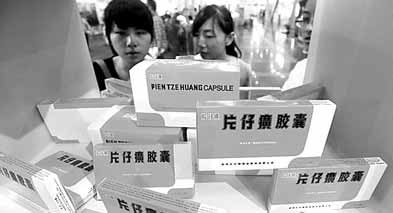Two brands of traditional Chinese medicine with a common origin are headed to court over a trademark dispute.
Zhangzhou Pien Tze Huang Pharmaceutical Co recently announced that it had filed a lawsuit against Xiamen Traditional Chinese Medicine Co, claiming that the defendant infringed on its right to the trademark of its top product Pien Tze Huang, according to a report from National Business Daily.
In the announcement, it also made allegations of unfair competition, saying the Xiamen company's advertisement made false comparisons between its own Babao Dan and Pien Tze Huang, causing injury to the latter's reputation.
The plaintiff has asked for 30 million yuan ($4.9 million) as compensation and that the Xiamen company stop the advertisements on the Chinese mainland, in Hong Kong, Indonesia and other countries and regions where its product is sold.
The Zhangzhou intermediate people's court accepted the case on Jan 17.
Pien Tze Huang is a famous Chinese traditional medicine used to help relieve internal heat, flush out toxins, cool the blood and reduce stasis. It is one of the national confidential varieties of traditional Chinese medicines.
The drug can also be used to treat acute, chronic or vital hepatitis, infections and inflammations as well as injuries resulting from falls, fractures, contusions and sprains.
On the other hand, Babao Dan, which literally means "pastille of eight treasures", boasts the similar functions as Pien Tze Huang, because the two traditional medicines are developed from a common ancient recipe that was invented by an imperial doctor in the Ming Dynasty (1368-1644), according to Xiamen Traditional Chinese Medicine.
Now, the modern recipes of these two medicines are different, but still share many similarities.
Xiamen Traditional Chinese Medicine's parent company Shanghai Pharmaceuticals Holding Co reported that it had not received any notice from the court.
But a representative told China Business News that it has paid great attention to the lawsuit and asked the Xiamen subsidiary to handle the case "with a proper and serious attitude".
Lin Junfeng, secretary to the chairman of the Xiamen company, said the company "is extremely shocked by the sudden lawsuit, because the two companies have coexisted in peace for years".
He also said the company, as one of the traditional Chinese medicine practitioners, would continue to "carry on the traditional techniques and respect the business rules to flourish the industry together with its peers".
But an industrial insider told National Business Daily that increasingly fierce market competition was very likely the factor behind the conflict.
Although they claim similar medical effects, the annual sales income of Babao Dan in 2013 was around 70 million yuan, while the sales of Pien Tze Huang reached about 800 million yuan in the same year, according to statistics from Shanghai Pharmaceuticals Holding.
So the Shanghai company decided last year to invest more in the promotion of Babao Dan to strive for a greater market share.
You Yunting, a partner at DeBund Law Offices based in Shanghai, said the verdict will be influenced by two important factors - whether the two medicines have indivisible historical origins and whether the Xiamen company has exaggerated its product in the ads or may cause any confusion for customers to the two medicines.
haonan@chinadaily.com.cn
|

Pien Tze Huang displayed at a health product exposition. Zheng Shuai / for China Daily
|
(China Daily 01/22/2014 page17)

